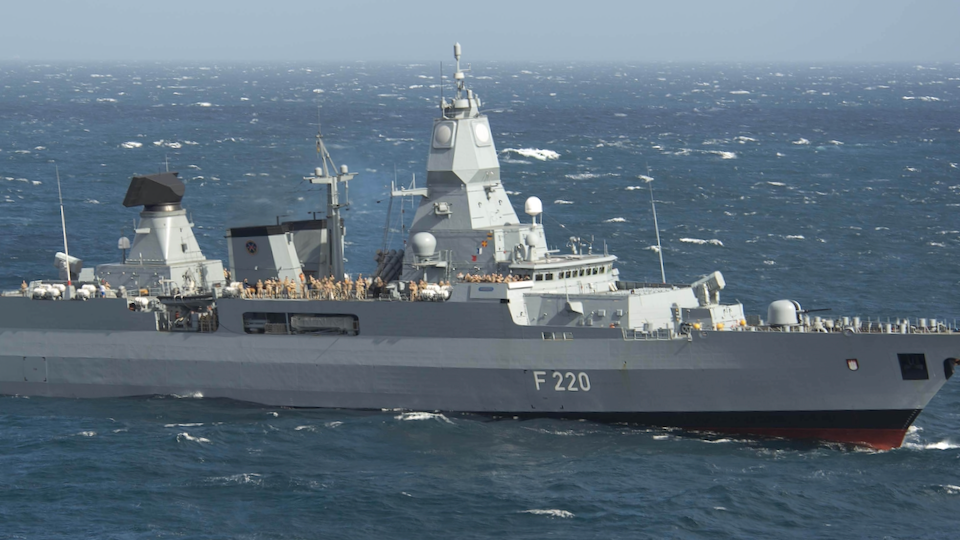Greenpeace Study: EU Military Missions Used to Secure Oil and Gas

Oil and gas continue to be so important to the states of the European Union that they regularly deploy the military to secure supplies. This is the result of a new Greenpeace study. According to the study, almost two-thirds of the deployments in recent years were also related to securing fossil energy sources.
Using Italy, Spain, and Germany as examples, the authors examined EU and NATO military missions from 2018 to 2021. The underlying data came from public documents and public statements by politicians and the military.
The three countries studied would have spent at least €4 billion on military operations of this kind since 2018 – €1.2 billion in 2021 alone. According to the report, these missions would have served “primarily or to a significant extent” the purpose of securing the production and import of crude oil and gas. EU countries import nearly 90 percent of their oil and 70 percent of their natural gas needs.
The environmental organization Greenpeace is calling for an exit from oil and gas use and consequently an end to these military missions. “With military missions, the EU is protecting its oil and gas supplies, which should have long since ceased in the midst of the climate crisis,” commented Anna von Gall, disarmament expert at Greenpeace Germany. “European countries are investing billions in the destruction of our climate. Instead, the money should rather flow into the faster expansion of renewable energies in order to achieve the Paris climate goals.”
“It’s always about fossil fuels.”
Some of Europe’s fuel imports come from politically unstable regions such as the Horn of Africa, Guinea or Libya. These regions all have major oil reserves. The military operations are intended to secure the transport routes and ensure political stability in the supplier countries.
As examples, Greenpeace cites the EU missions “Irini” and “Mare Sicuro” off the Libyan coast, “Atalanta” in the so-called Horn of Africa, “Sea Guardian” in the eastern Mediterranean, the anti-piracy missions in the Gulf of Guinea, “Global Coalition Against Daesh” in Iraq and Syria, and “EMASoH” in the Strait of Hormuz.
“Irni,” for example, is primarily to monitor compliance with the UN arms embargo against Libya off the Libyan coast. However, beyond that, the mission has the secondary mandate of “controlling and monitoring illegal oil exports from Libya, including crude oil and refined oil products” and is also supposed to secure the oil market in the region.
The “Atalanta” mission is intended to protect aid supplies to Somalia and at the same time prevent piracy in the Horn of Africa. However, NATO had also stated in June 2021 that such anti-piracy missions would also “contribute to energy security” by “protecting important sea lanes.”
“Energy security,” it said, is always about fossil fuels, not renewables. “It is fossil fuels that are transported long distances by sea to the European Union,” the authors write.
Italy helps energy company
With “Mare Sicuro” and “Gabinia Operation” on the Libyan coast and in the Gulf of Guinea, respectively, Italy was involved in two operations explicitly aimed at protecting the interests of the national energy company Eni. One of the official objectives in the mission descriptions was “energy security.”
In the mission mandate of “Mare Sicuro”, “monitoring and protection of Eni platforms in international waters off the Libyan coast” is the first point. The anti-piracy mission “Gabinia Operation” also lists the “protection of Eni assets” as its first task. A hearing of the defense minister in Parliament also proved that energy interests play an important role in Italian military policy, he said.
Spain does not pursue its energy interests as openly as Italy. However, the deployment of warships to the Gulf of Guinea is explicitly justified by Spanish oil and gas interests.
Germany fears for security
Greenpeace also accuses Germany of participating in “fossil missions” of the EU, NATO and UN. For example, Germany is participating in the “Irini” mission. There, German forces are tasked with investigating illegal oil exports from Libya.
“Sea Guardian” is also taking place with German participation in the Mediterranean region and is intended, among other things, to protect “critical maritime infrastructure.” This means ports, pipelines and offshore facilities, among other things. In other words, important infrastructure for oil and gas production and transport.
Improvement possible
Fossil fuels are the underlying interest behind many military missions, the authors of the study conclude. “Risking the lives of civilians and soldiers in 2021 and spending scarce financial resources on military protection of oil and gas imports is reminiscent of a wrong-way driver who, despite all warnings, not only stubbornly stays in his lane, but accelerates.,” they write. Fortunately, in the case of these military missions, public pressure can put a stop to the “misguided practice.”
“Turning away from oil and gas (and thus expanding renewable energies) has a triple-positive effect: it will reduce the risk of military confrontation, protect the climate and save financial resources for urgent matters, such as a stronger and more just ecological transition,” the report appeals. (hcz)